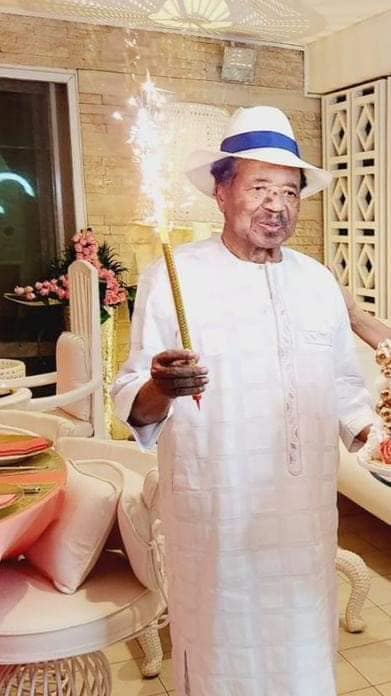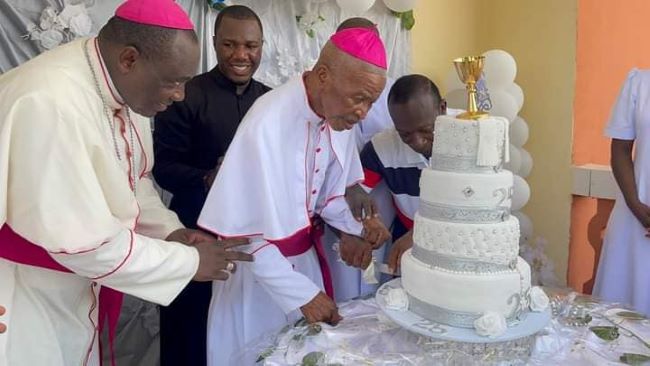Categories
Recent Posts
- Diocese of Buea: Bishop Bibi recognizes pastoral agents’ “hard work, sacrifices”
- BEAC sets two-week deadline to withdraw CFA150bn from banks in inflation battle
- Yaounde: Dion Ngute discusses upcoming S.Korea-Africa summit with visiting Minister Kang
- Tens of thousands of trained teachers, doctors and nurses have fled Cameroon
- US: Trump fined $9,000 for repeatedly violating gag order in hush money trial
Archives
- May 2024
- April 2024
- March 2024
- February 2024
- January 2024
- December 2023
- November 2023
- October 2023
- September 2023
- August 2023
- July 2023
- June 2023
- May 2023
- April 2023
- March 2023
- February 2023
- January 2023
- December 2022
- November 2022
- October 2022
- September 2022
- August 2022
- July 2022
- June 2022
- May 2022
- April 2022
- March 2022
- February 2022
- January 2022
- December 2021
- November 2021
- October 2021
- September 2021
- August 2021
- July 2021
- June 2021
- May 2021
- April 2021
- March 2021
- February 2021
- January 2021
- December 2020
- November 2020
- October 2020
- September 2020
- August 2020
- July 2020
- June 2020
- May 2020
- April 2020
- March 2020
- February 2020
- January 2020
- December 2019
- November 2019
- October 2019
- September 2019
- August 2019
- July 2019
- June 2019
- May 2019
- April 2019
- March 2019
- February 2019
- January 2019
- December 2018
- November 2018
- October 2018
- September 2018
- August 2018
- July 2018
- June 2018
- May 2018
- April 2018
- March 2018
- February 2018
- January 2018
- December 2017
- November 2017
- October 2017
- September 2017
- August 2017
- July 2017
- June 2017
- May 2017
- April 2017
- March 2017
- February 2017
- January 2017
- December 2016
- November 2016
- October 2016
- September 2016
- August 2016
- July 2016
- June 2016
Featured
Most Commented Posts
 4 Anglophone detainees killed in Yaounde
4 Anglophone detainees killed in Yaounde
19 comments Chantal Biya says she will return to Cameroon if General Ivo Yenwo, Martin Belinga Eboutou and Ferdinand Ngoh Ngoh are sacked
Chantal Biya says she will return to Cameroon if General Ivo Yenwo, Martin Belinga Eboutou and Ferdinand Ngoh Ngoh are sacked
13 comments Anglophone Nationalism: Barrister Eyambe says “hidden plans are at work”
Anglophone Nationalism: Barrister Eyambe says “hidden plans are at work”
12 comments The Anglophone Problem – When Facts don’t Lie
The Anglophone Problem – When Facts don’t Lie
12 comments Largest wave of arrest by BIR in Bamenda
Largest wave of arrest by BIR in Bamenda
10 comments
Latest Tweets
Featured
-

Diocese of Buea: Bishop Bibi recognizes pastoral agents’ “hard work, sacrifices”
-

BEAC sets two-week deadline to withdraw CFA150bn from banks in inflation battle
-

Yaounde: Dion Ngute discusses upcoming S.Korea-Africa summit with visiting Minister Kang
-

Tens of thousands of trained teachers, doctors and nurses have fled Cameroon
-

US: Trump fined $9,000 for repeatedly violating gag order in hush money trial
-

Cameroon Employers Association: Célestin Tawamba’s landslide victory raises questions
-

At Yaoundé Forum: mayors resolve to make birth registration a top priority
© Cameroon Concord News 2024





1, September 2023
General Brice Oligui Nguema, the man who destroyed the Bongo dynasty 0
General Brice Oligui Nguema, who was named Gabon’s new leader in the hours following a military takeover on Wednesday, served the central African country’s long-time former president Omar Bongo before turning on his son, ousted leader Ali Bongo.
General Nguema has been chief of the republican guard, the country’s most powerful army unit, since 2019, with close sources describing him as charismatic and respected. The first statement announcing the coup was read out in the courtyard of the presidential palace, a fortress protected by his military unit.
Said to be discreet and secretive, Nguema was absent from the first three statements read out by senior army officers on national television to announce the coup.
But Gabonese television kept broadcasting the same images: a man, apparently Nguema, in fatigues and a green beret being carried through the streets of the capital Libreville by jubilant soldiers chanting, “Oligui président.”
Nguema also emerged as a spokesperson in the hours following the announcement, answering questions from French newspaper “Le Monde”.
Bongo – who was declared the winner of Saturday’s elections just an hour before the coup began – had been forcibly “retired” but he still “enjoys all his rights”, Nguema said. “He had no right to serve a third term; the Constitution had been flouted and the election method itself was not good. So the army has decided to turn the page, to fulfill its responsibilities.”
He underscored the “discontent” in Gabon and Bongo’s “illness”, referring to a stroke in 2018.
As Bongo was confined to house arrest, Nguema himself was named to lead Gabon’s transitional authority, held aloft by his troops amid jubilant celebrations in the streets of the capital Libreville and the economic hub of Port-Gentil.
A ‘man of consensus’
Born to a Fang father, Gabon’s main ethnic group, Nguema, 48, mostly grew up with his mother in Haut-Ogooue province, a Bongo stronghold.
Nguema served as an aide-de-camp to Ali Bongo’s father, Omar Bongo, who ruled Gabon with an iron fist for almost 42 years until his death in 2009.
“He’s someone who knows the Gabonese military apparatus very well, a good soldier, trained at good military schools,” including Morocco’s Meknes royal military academy, according to a member of Bongo’s Gabonese Democratic Party (PDG) who was speaking on condition of anonymity.
“When I met him, he was a fairly intelligent man, easy to talk to and not afraid of journalists,” Francis Kpatindé, a journalist and lecturer specialising in Gabon at Sciences-Po University Paris, told FRANCE 24.
Nguema was known to be extremely close to the elder Bongo, serving him from 2005 until his death in a Barcelona hospital.
But Nguema was sidelined in 2009 after Ali Bongo was elected to succeed his father, beginning a 10-year stint as a military attaché at Gabon’s embassies in Morocco and Senegal.
He returned to prominence in 2018 as the republican guard’s intelligence chief, replacing Ali Bongo’s half-brother Frederic Bongo, before getting promoted to general six months later.
As the keystone of Gabon’s security forces, the bald and athletically built Nguema pushed Ali Bongo to improve his men’s working and living conditions by upgrading their facilities, funding schools for soldiers’ children and refurbishing accommodations.
The measures earned him respect and sympathy from his colleagues, according to the PDG source.
“He isn’t very talkative, but very appreciated by his men. He’s a Julius Caesar, and Julius Caesar cares for the comfort of his legionaries,” the source said, referring to the Roman general.
The former colleague praised Nguema as “a man of consensus, who never raises his voice, who listens to everyone and systematically seeks compromise”.
Nguema included officers from all army branches in the junta’s Committee for the Transition and Restoration of Institutions, which has been established to lead Gabon into its next political era. Coup leaders have not yet offered a timeline for a return to civilian rule.
Source: AFP